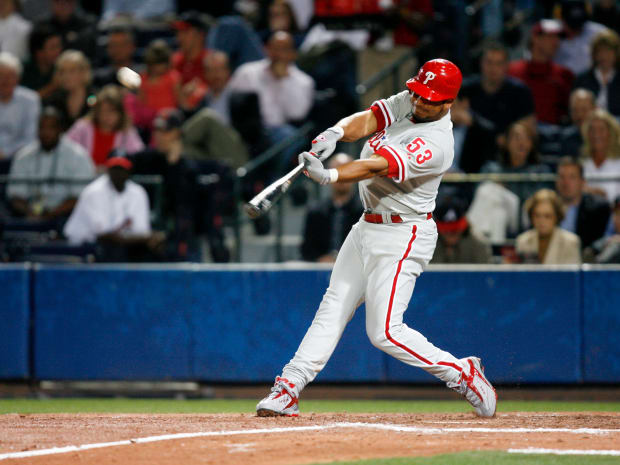If Bobby Abreu’s Hall of Fame voting returns follow the same trajectory as his career, perhaps the end result will be a hero’s welcome in Cooperstown.
Through his first three cracks on the ballot, the always-consistent slugger with patience ahead of his time and metronomic consistency has failed to receive more than 8.7% of the vote. But a slow start didn’t hinder Abreu from putting together an all-time great career that, though overshadowed by his contemporaries in terms of notoriety, was seldom topped from a production standpoint.

Paul Abell/USA TODAY Sports
Before becoming a Phillies mainstay for nearly a decade, Abreu signed with the Astros as a 16-year-old out of Venezuela. He quickly rose through the ranks, reaching High A at 19 and posting an .898 OPS at Double A at 20 in 1994, routinely appearing on top 100 prospects lists. A brief big-league debut in ’96 preceded a more extended look in ’97, with the then-23-year-old Abreu posting a .250/.329/.372 slash line over 59 games.
The decision by MLB to expand from 28 teams to 30 the next season proved to be a pivotal moment in Abreu’s career. Despite all the promise he showed in the minors, the Astros were unimpressed by his early returns in the majors and opted to leave him unprotected in the 1997 expansion draft. The Devils Rays selected Abreu with the sixth pick, then subsequently traded him to the Phillies for shortstop Kevin Stocker (surely that’s a move that Tampa would like back).
Perhaps it was the introduction to Philly cheesesteaks—or it was merely bound to happen eventually—but Abreu immediately developed into a lynchpin of the Phillies’ lineup. His debut season in the City of Brotherly Love started a run of five straight years with an OPS north of .900, and a remarkable 13 consecutive seasons playing in at least 150 games. As would become a theme of his career, though, his impressive early résumé went largely overlooked: Abreu earned down ballot MVP votes just three times during his 20s—with no All-Star selections—despite averaging 5.9 WAR through his first seven seasons in Philadelphia.
Abreu’s long overdue time in the spotlight finally came, sort of, in 2004 and ’05. His production was more or less the same as it had been in previous years, but this time it was rewarded with back-to-back All-Star nods, the only two of his career. He stole the show at the ’05 Midsummer Classic, winning the Home Run Derby.
For his efforts, Abreu won his only Silver Slugger award in 2004 and his lone Gold Glove in ’05. He remained an above-average starter for the next several seasons, bouncing around with the Yankees and Angels before a lackluster career finish with brief appearances for the Dodgers and Mets.
Through it all, two things stand out when assessing Abreu’s body of work: the staggering level of consistent mastery and the stark absence of notable accolades. In his prime—which lasted an incredibly long time—Abreu could do it all. From 1998 to 2009 (12 seasons), Abreu posted an on-base percentage above .400 eight times. He drew 100 or more walks eight times, hit 40 or more doubles six times and stole 25 or more bases nine times.
By the time he retired, he became one of just four players ever to amass 250 home runs and 400 stolen bases while maintaining an on-base percentage of at least .390. Also in the club are two inner circle Hall of Famers (Rickey Henderson and Joe Morgan) and the greatest player who ever lived (Barry Bonds).
In an era with historic (and chemically enhanced) power outputs, though, quiet consistency was never going to garner the same praise that gaudy moonshots did. In his 18-year career, Abreu never finished better than 12th in MVP voting (and only received votes seven times). There is scarce black ink on his Baseball-Reference page: He led the majors in triples (11) in 1999, led the National League in doubles (50) in 2002 and topped the majors in walks (124) in ’06, the same year he was traded midseason to New York. Amplifying his relative anonymity is the fact that the Phillies never made the postseason with Abreu anchoring their roster. Their five consecutive first-place finishes began the next year. In total, Abreu played in 20 postseason games with the Astros, Yankees and Angels, and never reached the World Series.
Spending nearly two decades getting overlooked does not mean that Abreu’s Cooperstown fate is sealed. While he still projects to fall well short of the 75% threshold needed for induction this time around, he’s up to nearly 18% in the early voting returns. And there’s precedent for someone making strides toward 75% after starting from a similar place: Abreu’s former Phillies teammate, Scott Rolen, received 11.9% of the vote in 2018, his first year on the ballot. He got 69.8% of the vote last year, and is currently tracking to be inducted in the ’23 class.
Abreu has a ways to go to reach the necessary level of support. But if there’s one lesson to take from his 18 sensational years in the big leagues, it’s that, in the long run, it’s unwise to count him out.







